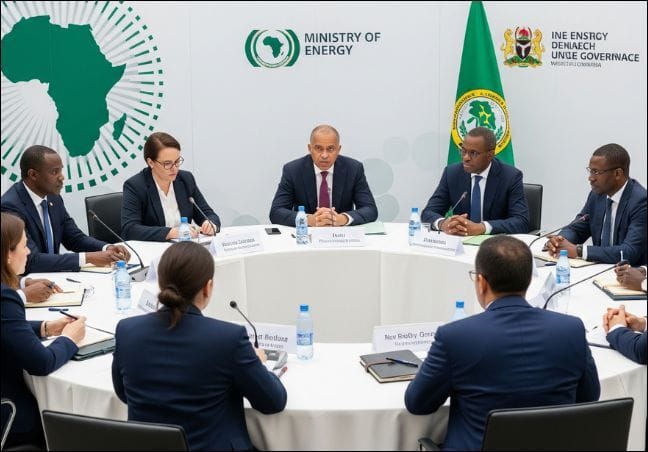- Hydrogen Rising
- Posts
- Why African countries need dedicated hydrogen authorities
Why African countries need dedicated hydrogen authorities

From the newsletter
A new report by Egypt-based think tank Entlaq warns that the country’s green hydrogen ambitions are at risk due to institutional fragmentation. Without a central authority overseeing hydrogen development, overlapping mandates and regulatory delays are stalling progress, a cautionary tale for other African nations pursuing similar goals.
The lack of a unified institutional framework in Egypt has created a governance vacuum that complicates everything from permitting to investment readiness, leaving projects stuck in early-stage feasibility or stall before actual investment decisions.
The situation in the North African nation reflects a broader continental trend where most producers lack a centralised authority, exposing projects to fragmentation, delays and investor uncertainty.
More details
Published on 17 July and prepared in partnership with Egypt’s Ministry of Planning, Economic Development and International Cooperation (MoPEDIC), the Cleantech and Energy 2025 Report provides a comprehensive mapping and diagnostic of Egypt’s cleantech landscape, from policy and regulatory frameworks to market dynamics. It focuses on two core cleantech sectors: water tech and energy tech, the latter of which includes renewable energy solutions such as green hydrogen.
The report observes that Egypt’s green hydrogen sector faces major implementation hurdles due to weak institutional coordination and fragmented oversight. While the country has announced several large-scale hydrogen projects, progress has been slowed by regulatory bottlenecks and governance inefficiencies. Responsibilities are spread across multiple ministries, including energy, environment, investment and international cooperation, with no single institution clearly empowered to lead.
It notes that, despite the establishment of a Hydrogen Coordination Committee in 2023, the initiative has not yet delivered the regulatory clarity, technical evaluation capacity or investment facilitation needed to accelerate project development. This has resulted in overlapping mandates, delayed approvals and persistent uncertainty, leaving many projects stuck in early-stage feasibility or pre-FID phases. These governance gaps, the report suggests, risk undermining investor confidence and delaying Egypt’s hydrogen transition.
Egypt’s poor governance of green hydrogen development is emblematic of a wider issue facing African hydrogen pioneers, an acknowledged barrier to the continent’s green hydrogen ambitions. Across Africa, responsibilities for hydrogen development are often divided among climate units, energy regulators, port authorities and state-owned utilities. In many countries, these roles are governed by temporary memoranda of understanding rather than clear legal mandates or long-term policy frameworks. This results in ambitious announcements that rarely translate into infrastructure.
For instance, despite its large-scale hydrogen ambitions, South Africa has yet to establish a centralised hydrogen authority. The country’s Hydrogen Society Roadmap is led by the Department of Science and Innovation but, much like Egypt, hydrogen-related responsibilities remain fragmented across ministries such as energy, transport and industry. No single institution is empowered to coordinate strategy, streamline permitting or facilitate investment. This fragmentation threatens to stall South Africa’s transition from pilots to commercially viable projects.
In contrast, Morocco offers a more coordinated model. Its national renewable energy agency Moroccan Agency for Sustainable Energy (MASEN) acts as a central authority, aligning strategy, permitting and investment readiness under one institutional umbrella. MASEN’s structure has allowed Morocco to move from ambition to implementation more smoothly, providing a model that other African countries could emulate.
Namibia has also taken steps in this direction by appointing a presidential level green hydrogen commissioner to oversee the Namibia Green Hydrogen Programme, helping coordinate ministries, investors and donors. While the role is not underpinned by a legal mandate, and therefore has limited authority over critical areas such as land use and water allocation, it represents a step in the right direction.
The report argues that for Egypt, and for Africa as a whole, the creation of centralised hydrogen authorities is now essential. These entities must do more than coordinate; they must consolidate energy, industrial and environmental goals into a coherent hydrogen roadmap. They should serve as single windows for investor engagement, permitting and land access, while also aligning infrastructure planning across water, grid and port sectors. Critically, they need the authority to set and enforce safety, certification and sustainability standards in line with international markets, and to shape domestic offtake and pricing mechanisms.
Without such institutional clarity, Africa’s hydrogen economy risks being trapped in perpetual feasibility. In Egypt, even its most advanced projects, such as the 100-megawatt pilot led by Scatec and Fertiglobe, or Masdar’s planned 2-gigawatt electrolyser, remain stalled at the pre-investment stage, due in part to the absence of a coordinated permitting and regulatory framework.
The case for hydrogen authorities is not only about streamlining, it is also about inclusion. As African countries aim to build local manufacturing capacity, foster domestic supply chains and ensure community benefit sharing, the lack of institutional leadership makes integrated planning nearly impossible.
Our take
Africa’s hydrogen future will depend not just on renewable energy potential but on governance. Without centralised hydrogen authorities, ambition will keep outpacing execution.
Investors are not just looking for megawatts, they are looking for clarity. In the race to attract green hydrogen capital, countries with strong central institutions will outpace those relying on fragmented governance and ad hoc coordination.
The next phase of Africa’s hydrogen transition will not be defined by more memoranda of understanding but by the strength of the institutions created to turn vision into infrastructure, and infrastructure into economic transformation.